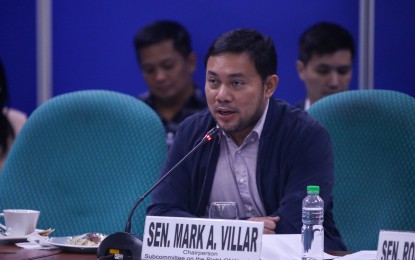
RIGHT-OF-WAY. Senator Mark Villar presides over the Committee on Public Works hearing to discuss several bills seeking to enhance the law on acquiring right-of-way to pave the way for government infrastructure projects, at the Senate on Thursday (Aug. 15, 20240. Villar said the objective of the proposed bills amending the Right-of-Way Act of 2016 is to make the law more responsive to the current needs of the implementing agencies. (Photo courtesy of Senate PRIB)
MANILA – Senator Mark Villar said Thursday that Republic Act (RA) 10752 needs to be amended to address the delays in infrastructure projects often caused by the slow acquisition of the right-of-way (ROW).
RA 10752, or the ROW Act, allows the government to acquire land for national infrastructure projects through various methods, including donation, negotiated sale, or expropriation, with compensation based on current market value.
During the public hearing of the Senate Sub-committee on the ROW Act, Villar said the law needs to be amended to make it more responsive to the needs of implementing agencies and ensure that private property owners affected by government infrastructure projects receive timely and just compensation.
"It is crucial to know how the ROW Act could be amended so it would be in sync with the dynamic changes in the infrastructure landscape," he said.
"We also need to ensure that the implementing agencies will be empowered to fulfill their mandates once the law has been amended to fit contemporary needs."
Villar said proposed amendments to the ROW Act should harmonize with recently legislated related measures, such as the reforms in Real Property, Valuation and Assessment, and the Public-Private Partnership laws.
Solving the bottleneck in ROW acquisition, he said, would enable the timely and efficient delivery of high-impact infrastructure projects that benefit the public and contribute to the country's economy.
The panel discussed Senate Bills 1537, 2718, and 2769, and House Bill 6571, which seek to revise the methods for acquiring real property, refining the rules on negotiated sale, establishing clearer guidelines for expropriation proceedings, and ensuring that government agencies receive appropriate funding to secure ROW sites or locations for national infrastructure projects before implementation.
These measures also seek to address stringent documentary requirements for untitled lands, which delay acquiring the ROW; the Indigenous People’s Rights Act, which prohibits the sale or destruction of indigenous communities' properties, posing challenges for projects passing through ancestral domains; and the law's ambiguity regarding compensation for informal settlers' structures, which creates uncertainty. (PNA)
